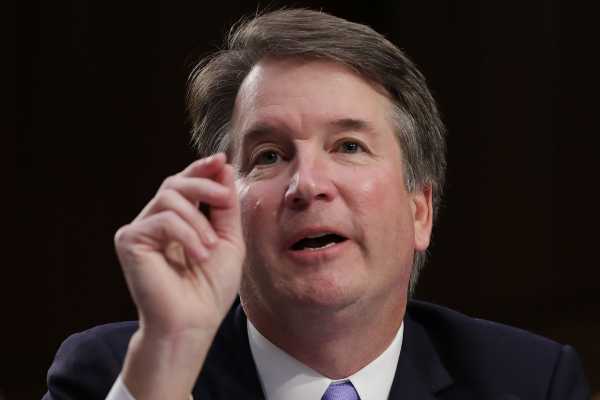
Supreme Court nominee Brett Kavanaugh wants lawmakers to know that he doesn’t have a gambling problem.
Inquiries about this issue, along with others regarding Kavanaugh’s stance on hot-button subjects like executive power and Roe v. Wade, were the focus of a lengthy list of written follow-up questions he received from members of the Senate Judiciary Committee.
The panel published his responses to the more than 1,000 written questions on Wednesday evening; the committee is slated to consider voting on his nomination on Thursday. These questions for the record are an opportunity for lawmakers to pointedly ask about subjects they’d like more information about in the wake of Kavanaugh’s contentious confirmation hearing last week.
In his responses, Kavanaugh remained steadfast in an unwillingness to answer questions about issues like the ability to subpoena a sitting president, while disclosing some revealing responses about how committed he really is to maintaining a broad scope of executive power.
Kavanaugh also offered additional insight into his seemingly murky financial situation, including those Nationals tickets purchases, and further denied any knowledge of retired federal Judge Alex Kozinski’s alleged history of sexual misconduct.
Here are five things we learned from Kavanaugh’s written answers to the Senate Judiciary Committee.
1) He says he doesn’t have gambling debts, and mentions those Nationals tickets … again
Kavanaugh’s reported debt, which amounted to between $60,000 to $200,000 in a 2016
Kavanaugh emphasized that he has no gambling debts, though his response regarding how the debts themselves were covered remains somewhat cryptic. He also details extensive home improvements that were tied to some of this debt.
Additionally, Kavanaugh dubs himself a “huge sports fan” and expounds a bit more on the number of Nationals season tickets he has purchased on an annual basis. He says that friends ultimately repaid him for the ones they ended up claiming.
2) He goes into even more detail regarding an expansive approach to executive power
While Kavanaugh declined to offer more information about how he viewed the constitutionality of potential prosecution of a sitting president or an indictment of a sitting president, he did reiterate his support for the executive office’s ability to exercise “prosecutorial discretion,” a perspective he vocalized in Seven-Sky v. Holder, a 2011 case examining the constitutionality of the Affordable Care Act’s individual mandate.
In that opinion, Kavanaugh noted, “Under the Constitution, the President may decline to enforce a statute that regulates private individuals when the President deems the statute unconstitutional, even if a court has held or would hold the statute constitutional.” Kavanaugh stood firm in his belief that the executive office is ultimately endowed with this power.
3) He doesn’t outright deny discussing Trump’s position on loyalty with others ahead of his nomination
There are several questions to which Kavanaugh offers a simple “No,” in response, including one in which he’s asked about whether he talked about his candidacy with former Supreme Court Justice Anthony Kennedy, ahead of his retirement.
In a marked contrast, he did not provide a direct response when asked if he’s ever discussed Trump’s position on loyalty.
Kavanaugh also provided some more details about his direct communications with Trump in the course of this process, indicating that the president has not asked for any commitments regarding how he would rule in different cases.
4) He emphasizes that he didn’t know anything about Judge Alex Kozinski’s alleged sexual misconduct
Kavanaugh has sought to distance himself from retired federal appeals Judge Alex Kozinski, someone he previously clerked for, who faces allegations of sexual harassment and assault from 15 women. Kozinski introduced Kavanaugh at his 2006 confirmation hearing and appeared to be someone the nominee considered an important professional influence.
During the hearing, when confronted with the allegations that have been levied against Kozinski, Kavanaugh very quickly downplayed their relationship. In his written answers, he further emphasized that he had not seen and was not informed of any alleged sexual misconduct Kozinski may have engaged in.
5) He denies any implications of perjury
One of the big questions looming over Kavanaugh’s confirmation hearing is whether he knowingly misled lawmakers on a wide array of issues during his 2004 and 2006 confirmation hearings — including his involvement in the controversial confirmation of Judge William Pryor, as well as his work on detainee policy in the Bush White House.
Democrats have also argued that he obscured his role on Bush-era wiretapping practices and hid his awareness of a hack that exposed thousands of Senate Judiciary Democrat documents. Kavanaugh, once again, maintained that he did not.
While any perjury claims against Kavanaugh would be unlikely to stick, critics argue that a Supreme Court nominee with a potentially questionable ethical record would disrespect the position and the process.
Sourse: breakingnews.ie
0.00 (0%) 0 votes


































